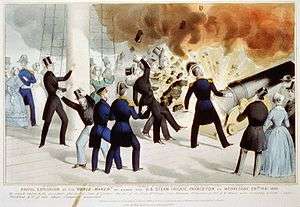USS Princeton disaster of 1844

The USS Princeton disaster of 1844 occurred on February 28 aboard the newly built USS Princeton when one of the ship's long guns, the "Peacemaker", then the world's longest naval gun, exploded during a display of the ship. Six people were killed:
- Armistead, the slave and personal valet of President John Tyler
- David Gardiner, father of Julia Gardiner, President Tyler's fiancée
- Secretary of the Navy Thomas Gilmer
- Beverly Kennon, the Navy's chief of construction
- Virgil Maxcy, American chargé d'affaires to Belgium
- Secretary of State Abel Upshur
Twenty people were injured as well. President Tyler survived the disaster because he was below decks.[1]
Background
The USS Princeton was launched on September 5, 1843, and was considered a state-of-the-art ship. It included the very first screw propellers, as well as 42-pound carronades. The ship was also home to two long guns, the "Oregon" and the "Peacemaker". The latter was the largest naval gun in the world. She was brought to Alexandria, Virginia, for a display. Dignitaries present included President John Tyler and his cabinet, former First Lady Dolley Madison, Senator Thomas Hart Benton of Missouri, as well as 400 other dignitaries. Refreshments were served in the salon below deck.
Captain Robert Stockton, who was excited to prove the Princeton's speed and weaponry, agreed to fire the Peacemaker in front of many onlookers. The original gun, the Orator (later renamed the Oregon, due to political disputes between Britain and the United States) and the Peacemaker were mounted onto the Princeton. Though the Orator had undergone intensive testing and had been reinforced due to cracks that were detrimental to the integrity of the cannon, Stockton rushed the second cannon (Peacemaker) and mounted it without much testing. According to Kilner, the Peacemaker was "fired only five times before certifying it as accurate and fully proofed." After several test runs, the Princeton was considered ready.
Explosion
The disaster occurred after Thomas Gilmer urged everyone to go upstairs for another demonstration of the guns; luckily for President Tyler, he was stopped for drinks by another dignitary. On its last firing, the Peacemaker exploded instantly, sending hot metal around the deck; 20 were injured, and six killed. The dead included Secretary of State Abel Upshur; Secretary of the Navy Thomas Gilmer; David Gardiner; Captain Beverly Kennon, the Chief of the Bureau of Construction and Repair; Virgil Maxcy of Maryland; and President Tyler's slave Armistead. None of the gun crew were killed.[2]
Aftermath
Secretary of State Abel P. Upshur was succeeded by John C. Calhoun of South Carolina, while Secretary of the Navy Gilmer was succeeded by John Y. Mason of Virginia. Upon hearing of the death of her father, Julia Gardiner is supposed to have fainted into President Tyler's arms. They were married four months later, on June 26, 1844.
Impact
The Peacemaker disaster, though deadly, allowed for a reexamination of the process used to make cannons. This led to the development of new techniques that allowed for stronger cannons which were more structurally sound, such as the system pioneered by Thomas Rodman. Had President Tyler been above deck at the moment of the explosion, he likely would have been killed, and President pro tempore of the Senate Willie Person Mangum would have been elevated to the presidency.
References
- ↑ Blackman, Anne (September 2005). "Fatal Cruise of the Princeton". Naval History. Reprinted by Military.com. Retrieved January 2, 2014.
- ↑ United States Congress (1844). Accident on Steam-ship "Princeton"...: Report [of] the Committee on Naval Affairs,.
Further reading
- Kathryn Moore, The American President: A Complete History: Detailed Biographies, Historical Timelines, Inaugural Speeches (Fall River Press, 2007), 120
- Robert W. Merry, A Country of Vast Designs: James K. Polk, the Mexican War, and the Conquest of the American Continent (NY: Simon & Schuster, 2009), 65-7
- Kinard, Jeff, Weapons and Warfare Artillery: An Illustrated History of it Impact (ABC Clio, 2007) 194-202
Coordinates: 38°47′56″N 77°02′24″W / 38.799°N 77.040°W